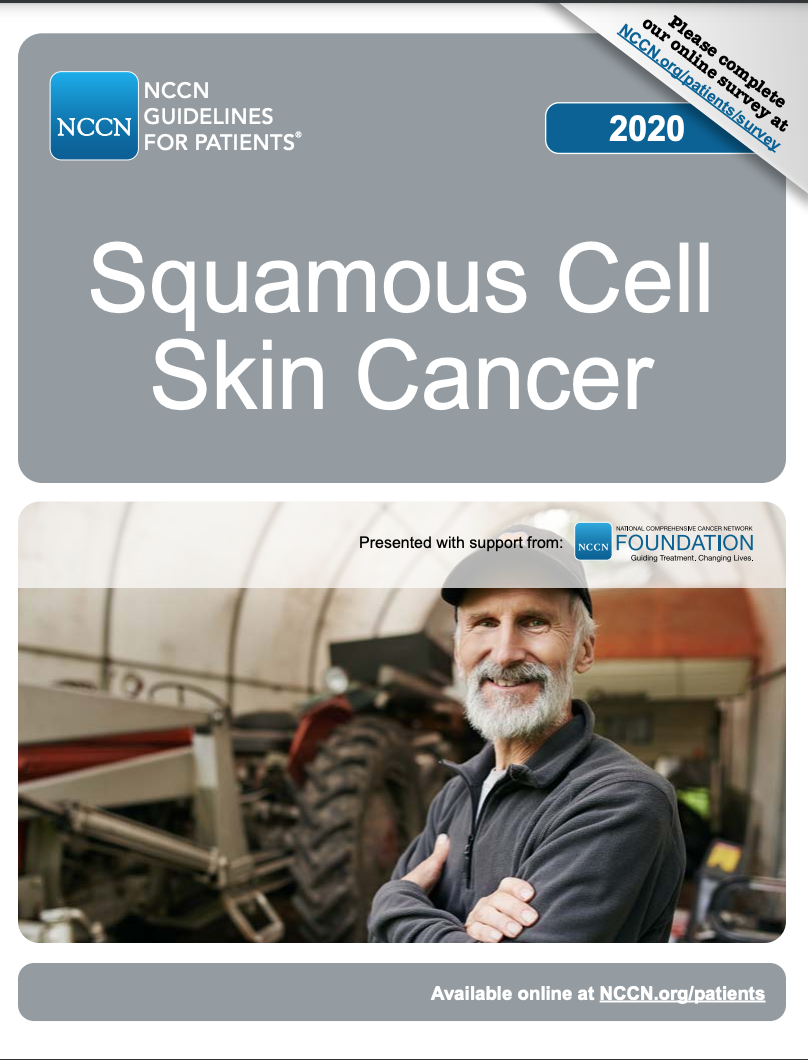Squamous cell carcinoma (SCC), which begins in the keratinocyte cells, is the second most common skin cancer. While SCC usually develops in areas that have been exposed to the sun, it can also manifest in burn or wound sites.
SCC is capable of spreading from the surface to deeper layers of skin, lymph nodes or organs. The annual incidence of metastasis of CSCC is approximately 4%. (Burton et al. Am J Clin Dermatol. 2016;17:491-508.)
There are two subtypes of SCC, Adenoid SCC and Desmoplastic SCC, which may have a higher chance of recurrence. Both subtypes often occur on the head or neck, and Adenoid SCC appears as a nude, brown, pink or red nodule.
Source: Canadian Cancer Society, “Squamous Cell Carcinoma“
Garry’s Journey: From Accepting Death to Embracing a New Life
Last year, Garry Hanwell was saying goodbye to his family in preparation for a medically-assisted death, the last resort in his relentless battle with cutaneous squamous cell carcinoma (cSCC), an aggressive and common form of skin cancer. Today, he’s planting a new garden and celebrating 70 years of marriage. Read more
Read the NCCN Guidelines for Patients®: Squamous Cell Skin Cancer
- Presents information in an easy-to-learn format
- For people with cancer and those who support them
- Step-by-step guides to the cancer care options likely to have the best results
- Based on treatment guidelines used by health care providers worldwide
- Designed to help you discuss cancer treatment with your doctors
Learn more about the NCCN Clinical Practice Guidelines in Oncology (NCCN Guidelines®) here
Videos
Squamous Cell Carcinoma: What Patients Need to Know
September 29, 2020
Dr. David Zloty, Dermatologist and Clinical Professor at UBC, reviews the latest news, clinical data and other updates as they relate to the treatment of cutaneous squamous cell carcinoma (cSCC), a common and sometimes metastatic skin cancer. Dr. Zloty provides an update on skin cancer statistics in Canada, an overview of the disease features, staging and prognostication, surgery and treatment options including immuno-oncology for cSCC, and the impact of all of this to patients.
Educational Video Series: What is Squamous Cell Carcinoma (SCC)
Sept 13, 2016
Press Releases
Watch our “Let’s Chat! Patient Submissions and Discussion” page for updates on current recommendations and approvals
First Biologic Treatment for Deadly Type of Skin Cancer Gets Strong Positive Recommendation to be Covered by Provincial Health Care
January 15, 2020
Save Your Skin Foundation Applauds the pan-Canadian Oncology Drug Review recommendation for Provincial Reimbursement of Libtayo™ for the treatment of Advanced Cutaneous Squamous Cell Carcinoma (cSCC)
“As skin cancer prevalence continues to grow in Canada, patients and their loved ones need options for treatment of this potentially deadly disease,” says Kathy Barnard, skin cancer survivor and founder of Save Your Skin Foundation. “Squamous cell carcinoma is not ‘JUST’ skin cancer – it is a wake-up call to all Canadians to be vigilant about the risks of skin cancer and the serious nature of its membership to the most common type of cancer.”
Toronto, Ontario
Read more>>
Save Your Skin Foundation Applauds Health Canada’s Notice of Compliance for Libtayo™ for the Treatment of Advanced Cutaneous Squamous Cell Carcinoma (CSCC)
April 11, 2019
CSCC is the second most common form of skin cancer accounting for approximately one- fifth of all skin cancer cases in Canada. When CSCC invades deeper layers of the skin or adjacent tissues, it is categorized as locally advanced. Once it spreads to other distant parts of the body, it is considered metastatic. Prior to today’s announcement, in 2018 Libtayo™ received FDA approval under Priority Review and was granted Breakthrough Therapy Designation status for advanced CSCC which was created to expedite the development and review of drugs that have the potential for substantial improvement in the treatment of serious or life-threatening conditions.
Read more>>
NOTE: The information on the Save Your Skin website is not intended to replace the medical advice of a doctor or healthcare provider. While we make every effort to ensure that the information on our site is as current as possible, please note that information and statistics are subject to change as new research and studies are published.
MONTHLY SELF-EXAMS ARE KEY TO EARLY DETECTION
Making awareness and education available is crucial. Since 2006, the Foundation has worked to raise awareness of melanoma and non-melanoma skin cancers focusing on education, prevention and the need for improved patient care.



